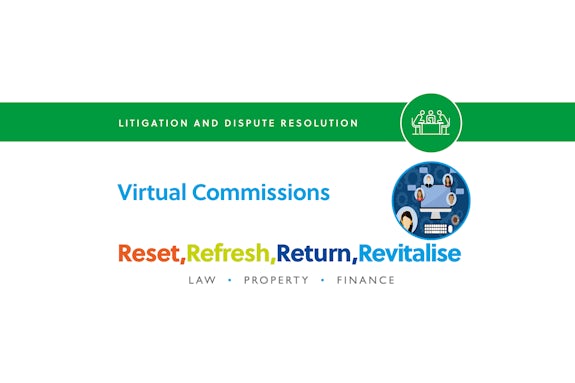
May 27, 2025

Although we’re experiencing a very long winter, the Commercial Litigation team at Gilson Gray are starting to look ahead to a time when things may return to something approaching normality. One of the questions we are concerned with is which procedural matters will return to how they were pre-COVID 19 and others which may change. One area we believe has worked well during lockdown and where this new flexibility should be retained in the future are Commissions for the recovery of documents.
Over the last few months we’ve been lucky to have fixed and run 3 Commissions which were entirely virtual. Although not flawless, this is certainly an area where virtual hearings can offer significant time and cost savings. If we think back to pre-lockdown, fixing a Commission could be a tortuous process. You need to coordinate several diaries and then find a suitable location. It may be that you have people travelling a significant distance to simply say they don’t have the documents sought. In addition, you might have several Havers and difficulties in coordinating when they need to attend and sometimes even the headache of trying to keep apart two parties whose relationship may have deteriorated.
From our experience, virtual Commissions run very well and help to get around many of the issues mentioned above. Although there can still be a large number of diaries to coordinate, matters are made much easier when you remove travel time and there’s no problem finding a suitable venue. This also benefits Havers or agents who may live or work far apart.
Using a virtual platform to perform a Commission speeds up the process of the Commission itself. Rather than having Havers all wait in a meeting room and having to wait for them to walk along a corridor and then make themselves comfy before starting, they can simply be placed in a virtual waiting room until such time as they are required. We’ve found that an agent will need to act as unofficial clerk to the Commissioner in dealing with allowing Havers into the Commission and then putting them into waiting rooms if there is an objection or removing them before the next Haver attends.
Although not desirable, it’s also far easier to re-arrange Commissions virtually. If some documents have been produced voluntarily and parties require time to look at them, it’s much easier for parties to place everything on hold for an hour and reconvene once they’ve had the opportunity to look at the papers.
There are of course matters which need to be thought about very carefully. One issue is how Havers can produce documents to the Commissioner, in particular, if redaction is required or confidentiality claimed. The simple answer to this seems to be that they are emailed to the Commissioner. If there were large volumes of hard copy documents then that might a situation where a traditional Commissioner may be preferable.
Going forward, there may be opportunities here a traditional commission is preferable however from our experience the use of virtual Commissions is a welcome development and one which we intend to make full use of.
If you would like further information on the topic discussed in this blog, please contact Iain Grant by email: igrant@gilsongray.co.uk or by phone: 0131 516 5375 / 07487 801 131. You can also view Iain’s profile by clicking here.
The information and opinions contained in this blog are for information only. They are not intended to constitute advice and should not be relied upon or considered as a replacement for advice. Before acting on any of the information contained in this blog, please seek specific advice from Gilson Gray.

Iain qualified as a Solicitor in our Commercial Litigation Team in 2015 having qualified by way of the Law Society Exams. He was previously a paralegal from 2005 onwards until becoming a trainee in 2013.